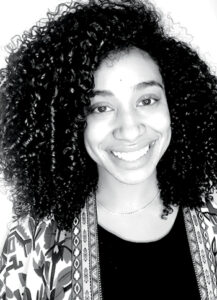READ OUR FULL INTERVIEW BELOW
Please describe your current and/or previous roles that relate to your work for justice and equality.
I currently manage Healthier Together, a $25M community impact initiative at Children’s Hospital of Philadelphia (CHOP), which tackles the social determinants of health in West Philadelphia through programs addressing housing, hunger, trauma, and poverty. Healthier Together uses a preventative health approach by going up-stream and addressing nonmedical factors that impact individuals living in underserved communities. This work has granted me the opportunity to further implement evidence based practices and provide access to high quality care to other underserved populations by becoming CHOP’s Ambassador to the US Virgin Islands
What about your work brings you the most joy or gives you the most pride?
I take pride in knowing that we are at the forefront of a new wave of healthcare, which takes a comprehensive intergenerational approach to stepping outside of the hospital’s four walls and looking at an individual’s holistic well-being while leveraging cross sector partnerships to develop sustainable goals and outcomes.
What is your most meaningful moment or significant accomplishment as it relates to your work for justice and equality?
My most significant accomplishment has been my personal and professional growth over the last decade. At first, I started at CHOP as an eager fellow, working part-time while attending graduate school at Drexel to now managing a $25M community impact initiative that will transform public health service delivery systems and positively impact thousands of lives.
What is the greatest hurdle you’ve had to overcome?
My greatest hurdle has been the personal quest of remaining my authentic self within the space of public health; whether it be from serving underserved populations that look a lot like myself to being the only person that looks like me in a room filled with powerful decision makers. This awareness not only represents the “hurdle” but reaffirms my life’s calling as being a custodian of health equity.
How do you empower those around you?
I empower those around me by being an active listener and inspiring team members to see their role in the bigger picture. If we are to address the deeply rooted social issues such as poverty and food insecurity, it requires that we collaborate and invent creative ways of doing so, which can only be done if everyone sees themselves as being part of the larger solution.
What short phrase would you offer others to inspire them to have hope and/or to take action?
I encourage others to create a mantra that works for them. One that resonates and inspires them to take action in their own life both on an individual and collective level. My personal mantra is “High-Pro-Glow-Flow” which motivates me to embody my best self, show up authentically, and use my voice to inspire others to shine their light and gifts on the world.
How has this summer’s civil unrest and calls for equity impacted you?
Because I believe that health is a human right, my work has always been focused on equity and sustainable development. The pandemic and civil unrest have done well to expose the injustices that are, in many ways, ingrained in the fabric of our society’s built environment. A design that forces our community members to disproportionately shoulder health disparities that are linked to their homes, places of work and school. Such realizations have strengthened my sense of civic duty and have reaffirmed my life’s work.
How has your perspective changed since the time you were a Lafayette student?
If anything, everything that has led up to this very moment has justified the curiosity that was calling me when I was a student at Lafayette. At that time, I designed my own major after studying abroad with the School of International Training which gave me the self-agency to design a major that would address the intricacies of social issues, such as public health and community development and their role in sustaining healthy communities. Being able to acknowledge what I am doing today and how my time at Lafayette paved the way for it feels full circle and is quite gratifying in hindsight.
 I believe that health is a human right. I currently manage a $25-million community impact initiative at Children’s Hospital of Philadelphia called Healthier Together, which tackles the social determinants of health in the West and Southwest Philadelphia community through programs addressing housing, hunger, trauma, and poverty. Healthier Together uses a preventative health approach, going upstream to address social factors that impact an individual’s health. What we are doing is at the forefront of health care. We are stepping outside of acute clinical care and looking at the whole individual.
I believe that health is a human right. I currently manage a $25-million community impact initiative at Children’s Hospital of Philadelphia called Healthier Together, which tackles the social determinants of health in the West and Southwest Philadelphia community through programs addressing housing, hunger, trauma, and poverty. Healthier Together uses a preventative health approach, going upstream to address social factors that impact an individual’s health. What we are doing is at the forefront of health care. We are stepping outside of acute clinical care and looking at the whole individual.